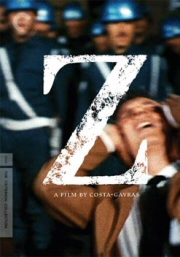- Rated PG
- Drama
- 1969
- Buy the DVD
Reviewed by Bob Westal
()
film about Greece, made by an expatriate Greek director, but featuring an all-star French-speaking cast, “Z” is, alongside John Frankenheimer's “The Manchurian Candidate” and Jean-Luc Godard's “Weekend,” one of the most important political films of all time. Even if, artistically and in terms of sheer entertainment, it's not quite on the same level as either of those masterpieces, it had an immediacy those films lacked. Unlike Godard and Frankenheimer, director Costa-Gavris wasn't only working out of political conviction, he was trying to free his homeland.
Shot and financed in the former French colony of Algeria, “Z” is based on a thinly fictionalized novel by Vasilis Vasilikos detailing the 1963 murder of pacifist leader Gregoris Lambrakis and the investigation that followed. Presaging the John F. Kennedy assassination by several months, the killing helped set the stage for a full-scale fascist military takeover of Greece, which lasted from 1967 to 1974. That, in turn, set the stage for Costa-Gavris, a promising young director hot off the success of his first film, “The Sleeping Car Murders,” to recruit a cast of mostly French stars to participate in a film designed specifically to raise a worldwide alarm. With the tacit acceptance of the U.S. and Western Europe, the world's cradle of democracy was harboring a totalitarian regime that regularly tortured and murdered dissidents and had banned everything from the Beatles and long hair, to Mark Twain, Dostoyevsky, and a certain letter of the alphabet. With “Z,” Costa-Gavris made sure the world knew that.
The contraband letter “Z” letter stands for “he lives” in Greek. The film “Z” begins as a pair of advance men (Charles Denner and François Périer) prepare for the arrival of a charismatic political leader (Yves Montand). As their original venue cancels due to political pressure and a death threat is received, the leader insists on appearing in public to speak against the presence of U.S. bases in his country. He is attacked on the way, but refuses to be dissuaded. After the speech, he is caught in the middle of a gigantic demonstration with both supporters and enemies clogging the street. As he tries to ask nearby police for help in calming the crowd, he is clubbed and run over, dying days later as his anguished wife (Irene Pappas) tries to make sense of the tragedy.
The killing has been orchestrated to appear to be the random result of political chaos, but it is the work of a military conspiracy involving, among many others, an extreme-right general (Pierre Dux) and a pair of political thugs (Renato Salvatori and Marcel Bozzuffi, later the unlucky hitman from “The French Connection”). The country, though nominally democratic, is already mostly under the thumb of the far right and civil liberties are close to nonexistent. The only people who may be able to expose the truth are a stubbornly truthful, apolitical witness (Georges Géret), an opportunistic young journalist out for a scoop (Jacques Perrin, who also produced), and a conservative investigating magistrate aligned with the ruling party (Jean-Louis Trintignant).
Though far more personally committed to making real political change than the most famed directors of the New Wave, Costa-Gavris (a typo-born mutation of his birth name, Constantinos Gavris) was also somewhat unusual among European political filmmakers of his day for his clear understanding that leftist totalitarianism was just as totalitarian as the right-wing kind. His political clarity was matched by an aesthetic that was influenced both by the looser, more energetic, and documentary-like approach of the worldwide New Wave, as well as the classical/American moviemaking tradition. Though that earned him the suspicion of some leftist European intellectuals, it's also probably one reason “Z” was a major award-winner both at Cannes and the 1970 Oscars, winning two awards, including Best Foreign Language film, while also being the first foreign language production to be nominated for Best Picture.
All of this is not to imply that “Z” necessarily goes down as easy as your standard-issue American thriller. For one thing, this is a story without traditional protagonists. Top-billed Yves Montand (“Let's Make Love,” “Grand Prix,” “On a Clear Day You Can See Forever”) and Irene Pappas (“The Guns of Navarone,” “Zorba the Greek”) were both enormously famed international stars, but their parts are brief, though indelible. “Z” is essentially an ensemble piece where individual characters emerge to dominate the story briefly and, for the most part, move on as the film's detailed but fast-paced progress continues.
The exceptions are the two figures whose job it is to investigate the incident. A lot of reviewers say that Jean-Louis Trintignant’s prosecutor is effectively the protagonist but, with his dark glasses and his insistence that the murder be referred to only as “the incident,” we are deliberately kept at arm’s length from his motives. Jacques Perrin’s young reporter on-the-make is far more of an open book, but he’s also there largely as our eyes and ears and not really any more a protagonist than the faceless reporter of “Citizen Kane.” Georges Géret’s unflappably honest witness, who remains a steadfast friend of the truth despite unrelenting pressure at home from his worried mother (Andrée Tainsy) and viciously angry right-wing sister (Magali Noël), could have easily been the hero of his own feature, but not this one. Characters may behave nobly at times, but if “Z” has a hero, it’s the truth.
Costa-Gavris and screenwriter Jorge Semprún – a World War II resistance leader and an estranged ex-leader of Spain's communist party – nevertheless give us plenty to hang onto, including a great deal of pitch-black humor, occasionally bordering on slapstick. Gavris also presents a number of suspenseful action sequences that owe more than a little to America's premiere maker of political thrillers, John Frankenheimer, who also had a flair for dark satire. And then there is a strong cast of characters embodied by a uniformly excellent cast. Stand-outs include Montand and Pappas, but also Jean-Louis Trintignant, who took the acting award at Cannes, as well as Pierre Dux’s villainous general, an often snarkily funny study in delusional self-righteousness.
In every way, “Z” is about as well-crafted as movies get. Catching all the action and conflict seemingly on the fly, cinematographer Raul Coutard – maybe the greatest cinematographer of the French New Wave – plays an enormously crucial role, while editor Françoise Bonnot won a well-deserved Oscar. And, finally, attention must be paid to the propulsive, memorable and entirely nation-specific music of composer Mikis Theodorakis (“Zorba the Greek”), who courageously allowed Costa-Gavris the use of his recordings while under house arrest. The music is crucial in that it ties the film – which scrupulously avoids proper names of both people and places – very specifically to Greece and not just some nameless Mediterranean nation.
In reviewing “Z,” it’s a little hard to divorce myself from the fact that, aside from it being an undeniably very good movie, I find myself in remarkable agreement with the politics of its director and admiring of the way he tries to hew closely to the fact. (That's something I can't really say about #1 Costa-Gavris follower Oliver Stone.) Still, it's one thing for me to be “even-handed” about a totalitarian regime that was to some extent propped up by America but perhaps not entirely created by it. It's quite another for a filmmaker whose friends and family suffered directly at that regime's hands to be able to step away from his personal experience, dispense with harangues and ideological posturing, and simply tell his country's story as honestly as he can manage. If that's not patriotism and integrity, I don't know what is.
Criterion Collection DVD Review:
This is from Criterion, so do I even need to bother to mention that it’s a first-rate package? The quality of the transfer is, naturally, first-rate and approved by none other than Raoul Coutard, who should know. There is also a pair of revealing and detailed new interviews with 70-something Costa-Gavris and 80-something Coutard, who seems ready to make a new movie tomorrow. There are also television interviews from the original release with the director, author Vassilis Vassilikos, and the leading cast members. And finally, there’s a solid commentary by film historian Peter Cowie, who does an excellent job situating “Z” in both film history and world history.
You can follow us on Twitter and Facebook for content updates. Also, sign up for our email list for weekly updates and check us out on Google+ as well.












